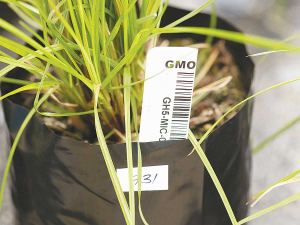State of the Dairy Nation 2024/25: DairyNZ Highlights Record Milk Production and Export Growth
DairyNZ's chief executive Campbell Parker says the 2024/25 dairy season reinforces the importance of the dairy sector to New Zealand.
 The furore surrounding the proposal to end New Zealand’s near 30-year ban on gene technology outside the lab isn’t going away.
The furore surrounding the proposal to end New Zealand’s near 30-year ban on gene technology outside the lab isn’t going away.
OPINION: Submissions on the Government's contentious Gene Technology Bill have closed.
However, the furore surrounding the proposal to end New Zealand's near 30-year ban on gene technology outside the lab isn't going away. There's opposition from within the Government's traditional support base - farmers and growers.
Gene technology isn't all bad of course. It's seen as being able to deliver enormous benefits, including access to better cancer treatments, and increased productivity for farmers through such things as disease-resistant and drought-resistant grasses, and tools to help meet emissions targets. The bill is seen by many as a major milestone in modernising our laws to unlock the potential of science.
There's support for the intent of the bill from dairy and sheep and beef farmers. However, some farmers are worried about the trade and market access risk.
DairyNZ points out that there is a well-established system and practices used for production of high-grade seed crops, which provide a working example of co-existence in practice.
Beef+Lamb NZ says that there are potential opportunities to improve farmers' productivity and environmental impacts. However, it says there are also several potential risks that still need to be addressed in the proposed legislation. These include potential market or trade implications, traceability and co-existence, and how risks are classified.
State-owned AgResearch supports the bull and says it provides the opportunity to align NZ's activities and regulations with those of our major trading partners such as the US, Australia, China, and potentially the EU.
But there's opposition from organic farmers who claim the bill is a threat to organic and conventional farmers, makes GMO-free certification impossible and places financial risks on farmers, not biotech companies. They also claim that deregulation of GE products could remove mandatory labelling, leaving consumers unaware of what's in their food, and economic and trade risks for New Zealand's $1 billion organic industry.
The Government remains committed. Gene technology is a powerful tool that has the potential to deliver enormous benefits for New Zealand, it says. They may have the numbers to pass the bill, but should not ignore the views of those who don't want it enacted.
The Meat Industry Association of New Zealand (MIA) today announced that Chief Executive Officer Sirma Karapeeva has resigned from the role.
The winners of the 2026 Hawke’s Bay/Wairarapa Dairy Industry Awards were announced at the annual awards dinner held at Copthorne Solway Park in Masterton on Thursday evening.
Environment Southland is welcoming this week’s decision by the Environmental Protection Authority (EPA) to approve the release of Blaptea elguetai, a leaf‑feeding beetle that will help control the highly invasive Chilean flame creeper.
This March, the potato industry is proudly celebrating International Women’s Day on 8 March alongside the International Year of the Woman Farmer, recognising the vital role women play across every part of the sector — from paddocks and packhouses to research, leadership, and innovation.
Fruit trader Seeka posted a record profit and returns to shareholders in 2025.
Recent weather events in the Bay of Plenty, Gisborne/Tairawhiti, and Canterbury have been declared a medium-scale adverse event.

OPINION: A mate of yours truly reckons rural Manawatu families are the latest to suffer under what he calls the…
OPINION: If old Winston Peters thinks building trade relations with new nations, such as India, isn't a necessary investment in…